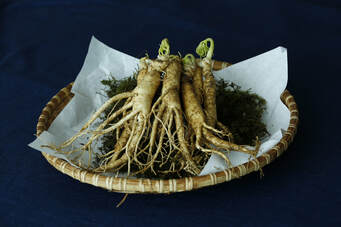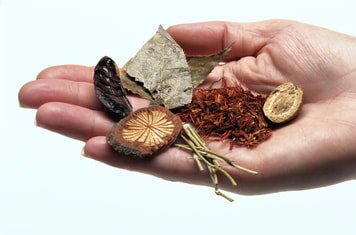 Ginseng is said to resemble a human body in shape, and it has been used for years in Asia. Recently, it has become a popular item in Western culture. Many claims about this root have been advertised, such as its reputation for extending longevity and its use for stamina and endurance. Let’s look at the types of ginseng and the differences. There are three main types of ginseng used: Panax Oriental Ginseng: This ginseng is stronger than American ginseng. It is used as a general tonic, immune booster, anti-oxidant, anti-cancer herb and to calm the mind. The taste, which in Chinese medicine indicates the organ it benefits, is sweet, slightly bitter and warm. This benefits the heart, spleen and lungs. As it is calming, it also helps relieve heart palpitations and insomnia. A main function in Chinese medicine is that this root generates fluids and quenches thirst in heat conditions. Ren shen benefits the “Original Qi,” hereditary energy we are born with and can help rid exhaustion. American Ginseng: American ginseng nourishes the yin of the body, especially in cases of the deficiency of yin. When one is deficient in yin, there are signs of heat in the yang that has become more exuberant. This ginseng root also helps fire excess, or exuberance of yang, because it generates fluids and helps dryness, heat, thirst and fever. Its taste properties are bitter and slightly cold. Siberian Ginseng: Siberian ginseng is not in the same category as the previous types mentioned. It is a weed, cheaper, and is used in Chinese medicine to help arthritis due to its benefit of dispelling cold and damp from the body, otherwise known as cold bi syndrome. It is best to see a Chinese medical specialist or another qualified health care practitioner to get ginseng in a formula appropriate for your particular constitution, as ginseng can have serious side effects such as heart palpitations, dry mouth, dizziness, headache, high blood pressure and anxiety. Those with excess yang energy should not take ginseng. There are also possible drug interactions with ACE inhibitors, blood pressure medications, blood thinners, diabetes medications, stimulants and antidepressants. Ginseng is best used as a preventative tonic rather than a medicine, as it can prevent a pathogen from leaving the body’s “comfortable house”. Your Chinese medical specialist can assess which herb is right for you and how to include it in a formula. It is not advisable to self-diagnose and take new herbs that may harm your health.  Next time you’re in a wide open field, pasture or meadow dotted with beautiful yellow dandelions, know that these prolific little delights are not only beautiful, but packed with nutrition and offer a host of healthy benefits. Let’s explore this amazing flower. Dandelions are known as Pu Gong Ying in pinyin and are used frequently in Traditional Chinese Medicine. The name comes from the French “dent-de-lioun,” which translates into “tooth of the lion” due to its sharp leaves. They are known to aid the liver, kidneys and gallbladder in particular. In Chinese medicine herbs are used to heal, this includes flowers, bark, roots and seeds. For example, if an herb is considered “warming,” it is given for cold conditions. An herb that is bitter would clear heat and detoxify. If an herb is sour it benefits the liver. If an herb is red it benefits the heart and blood. TCM creates herbal formulas that use a combination of different herbs to balance the formula and keep it safe. Dandelion is considered a cold, bitter and slightly sweet herb. Its milky juice clears heat, detoxifies blood, reduces swelling and helps the early stages of a cold. Dandelion helps the liver and gallbladder by increasing bile production, and helping in cases of jaundice. Often dandelion is combined with licorice, milk thistle and fennel. Here are some other key benefits of this flower:
It is ALSO in my favorite Coffee Alternative called Rasa which I kind of drink every day now. Full of adaptogenic herbs, that it TCM are usually longevity herbs or light tonics, it can improve energy while also strengthening your adrenals and improving your stress response. Basically - it's awesome. You can learn more by clicking HERE or you can check it out in my Portland office! Stress is something that affects everybody. Stress is defined as a state of mental or emotional tension or strain resulting from demanding or adverse circumstances. This can result in a multitude of symptoms, including headaches, muscle tension, pain, insomnia, worry, anxiety, depression and even disease. And according to a recent survey, nearly 77 percent of all Americans regularly experience physical or psychological symptoms caused by stress (American Institute of Stress, May 2017).
On a cellular level, chronic stress has actually been shown to shorten the immune cell telomeres. Telomeres are DNA-protein complexes found in chromosomes that promote genetic stability. When the body is stressed, the immune cells are less likely to duplicate and this puts the body at risk of infection or illness. So what can be done to reduce stress? The simple answer is a ton. Some examples of ways to deal with stress include exercising, journaling, meditation, coloring, getting a massage, reading, watching a movie, talking with friends, playing games, sitting in nature, eating healthy food and even acupuncture. This leads us to Traditional Chinese Medicine, a 3,000 year old medical system that can balance the body, relieve stress and decrease/prevent disease. TCM utilizes many modalities to treat people, but according to many scholars, it all began with herbal medicine. Herbs can be used alone or in conjunction with one another to create customized formulas that help heal the body. Here are some examples of herbs and formulas that can combat stress. 1. Eleuthro or Ci Wu Jia: This herb is an adaptogen, meaning it has revitalizing or restorative properties. In particular, Ci Wu Jia works very well for people who work high stress jobs, work long hours or have erratic schedules. It supports quality sleep and also strengthens the immune system. 2. Aswhagandha: While this herb is not regularly used in TCM, it is still a very potent herb for tackling stress. Specifically, ashwagandha helps with anxiety, fatigue and stress-induced insomnia. It is also used to support the immune system and stimulate the thyroid gland for those suffering from hypothyroidism. 3. Xiao Yao San: This herbal formula combines several herbs to become one of the most frequently prescribed formulas in TCM. Xiao Yao San soothes the liver, which according to TCM theory is where stress is controlled. 4. Cordyceps or Dong Chong Xia Cao: Cordyceps is a type of fungus found on caterpillars. It has been used by TCM practitioners for centuries to fight fatigue, support the immune system and protect the liver and kidneys. 5. Suan Zao Ren Tang: This herbal formula is very effective for treating agitation, insomnia, irritability and scattered thoughts. These symptoms are very common in people who are overworked and emotionally stressed out. Herbs can be very beneficial and help keep the body free from illness. The herbs and formulas mentioned above are just a few examples that would be good to have around if you suffer from stress and anxiety. To find out more about these herbs, reach out to us!  A study published by the National Institute of Health looked at the use of Chinese herbal formulas in conjunction with conventional medicine for the treatment of chronic rhinosinusitis. The study surveyed 4,294 patients who utilized Traditional Chinese Medicine and of these, nearly 97 percent received herbal remedies. The most commonly prescribed herbal formula for this condition was Xin Yi Qing Fei Tang. While the study did not look at the outcome of the use of the herbal remedy, it is conclusive more people are turning to alternative medicine in order to treat everyday problems like congestion. Congestion of the chest and sinuses is something everybody has experienced at some point during their life. It can be caused by allergies, the common cold or even changes in the weather. Regardless of the cause, it makes life difficult when we are unable to breathe properly. Many people reach for over-the-counter decongestants as a first line defense. But there are side effects to be aware of when using anything synthetically made in a lab. Natural remedies, like Traditional Chinese Medicine (TCM), are safer and can generally be used long-term without the side effects. An estimated 30 million people suffer with sinus problems, and congestion is one of the top symptoms associated with sinus issues. Most people who suffer with sinus issues have them for the majority of their lives. This is because once the problem has been cleared up using conventional medications or treatments, the sinus cavities themselves have not been completely drained and the body still sees the remaining mucus as a foreign invader it must attack. This is where Traditional Chinese Medicine surpasses conventional medicine. TCM addresses the symptoms and the root of the problem. So not only will the congestion be targeted, but so will be the cause of the congestion. Too much sugar causing excess phlegm? hronic allergy flare ups? Weak lungs due to asthma or COPD preventing you from expelling the pathogens? All of these things can lead to chronic congestion and TCM can help. TCM uses many tools to treat congestion. The two most commonly used are acupuncture and herbal formulas. One of the most commonly used herbal formulas is Cang Er San. This formula contains xanthium fruit, magnolia flower, angelica root and mint. If yellow mucus is present, then cooling herbs like honeysuckle flowers and Scutellaria root are added to address the excess heat. But the base formula unblocks the nasal passages, reduces inflammation and expels toxins, all of which lead to congestion. Another popular choice of TCM practitioners is Bi Yan Pian. This formula works to clear the nasal passages and it usually accomplishes this within five days to a week. The herbs in Bi Yan Pian work to disperse wind, expel toxins, relieve inflammation and dissolve phlegm. Ask me to find out how Traditional Chinese Medicine can help you with any respiratory and congestion issues you might have. CITATION: https://www.ncbi.nlm.nih.gov/pubmed/25511322  The common cold is something everybody deals with and there are a thousand different suggestions on how to avoid catching a cold. Everything from megadoses of vitamin C to increasing your sleep time. And while some of these are not bad ideas, there is not a lot of proof they can prevent a cold. Some people have stronger immune systems than others and this plays into how often they get sick. Also, there are many environmental factors to account for. And while nothing is going to work every time for every person, there are still ways a person can prepare for cold season. Traditional Chinese Medicine has been around for nearly 3,000 years and it utilizes many different tools to help people stay healthy. According to TCM theories, there are six causes of disease: wind, cold, summer heat, dryness, dampness and fire. The human body has to adapt to changes in these elements in order to remain healthy. The main cause of the common cold is wind and it is often associated with sudden or abnormal changes in the weather. Wind frequently combines with other forces to cause different types of illnesses. The most common are wind cold and wind heat. Wind cold invasions cause the types of colds that are usually experienced during the snowy winter months. Wind heat invasions cause the types of colds that are commonly seen during the warmer months, when the seasons change from spring into summer and summer into fall. Traditional Chinese Medicine has been very successful in treating people who suffer from frequent colds. Every person has an immune system that usually fights off invasions of bacteria and viruses. But sometimes, when a person is under a lot of stress or doesn’t sleep well or doesn’t eat right, then that immune system can become compromised and a cold may develop. TCM emphasizes prevention through the use of acupuncture, herbal formulas and diet. Regular acupuncture treatments can increase a person’s immunity, making it easier to fight off any foreign invaders. Herbs such as Angelica root is also frequently prescribed to rid the body of viruses. Andrographis or Chuan Xin Lian in Chinese is another herb that is frequently used because it reduces the severity of cold symptoms while strengthening the immune system. Forsythia fruit or Lian Qiao, is another herb that is used frequently to treat the common cold. There are other things that can be done to prevent the common cold and they are not specific to TCM, but they are recommended. For instance, covering the back of the neck is very beneficial. The nape of the neck is thought to be the entry point for many viruses. Therefore, keeping this area covered up especially when it is windy, may help keep a person from getting sick. Also, it is recommended to eat according to the season. So as the weather gets colder, one should eat more warm and cooked foods. One last thing that may be very beneficial in the prevention of colds is exercise. To keep energy flowing throughout the body, it is necessary to move. This is where incorporating a daily practice of tai chi or qi gong might be helpful. Both tai chi and qi gong are very easy to learn and the practices are low impact. Tai chi is even being used around the globe in senior homes to help the residents regain balance and keep them healthy, both mentally and physically. Consider adding Traditional Chinese Medicine to the toolbox when a cold comes on. A licensed acupuncturist and herbalist may be very beneficial to your health and well-being. Lucky for you we have both... ;) |
AuthorsRebecca M H Kitzerow is a Licensed Acupuncturist practicing in La Center, Washington. With over a decade of experience she has won 10 Nattie consumer choice awards from Natural Awakenings Magazine since 2014. Archives
July 2024
Categories
All
|
Photos from Hey Paul Studios, BeGreen_Studio, Pawel Pacholec, 1950sUnlimited, toulupaliaqaz, Joelk75, OnTask, Robert Gourley, cnu_sports, Mitya Ku, wuestenigel (CC BY 2.0), FootMassagez, 401(K) 2013, Mariana Heinz, @EdwardTerry, fishhawk, liverpoolhls, torbakhopper, Boemski, dolomitibl, Driscolltheque, Dave n Laura, Vaping360, MVWorks, Life Mental Health, MVWorks, mikefats, Scot Nelson, jfl1066, wZa HK, ruurmo, Guadalupe Cervilla, Army Medicine, GViciano, torbakhopper, adrigu, Saulo Cruz, Ben Cumming, marniejoyce, kcxd, JasonCorey, kanenas.net, Live to Create Photography, gm.esthermax, Unique Hotels Group, Zenspa1, mysiana, Tobias Lindman, Leader Nancy Pelosi, Kristoffer Trolle, swanksalot, Bill Selak, Parker Knight, stimpsonjake, Gedankensprudler, SuperFantastic, tonynetone, marniejoyce, JeepersMedia, Illusive Photography, 'Ajnagraphy', Iban Torras, scotted400, gtall1, dvanzuijlekom, BPPrice, Skley, torbakhopper, Renato Ganoza, anka.albrecht, QUOI Media, Public Domain Photos, Instant Vantage, Victor Tongdee, Free Grunge Textures - www.freestock.ca, sportEX journals, Nadja Tatar, angela n., marniejoyce, MVWorks, Karolina Kabat, Thomas Fisher Rare Book Library, UofT, ginnerobot, tracilawson, haven't the slightest, My Photo Journeys, Pierre Willemin, Florena_Presse, SuperFantastic, colindunn, zzkt, TraumaAndDissociation, ER24 EMS (Pty) Ltd., shixart1985 (CC BY 2.0), marniejoyce, Tomás Fano, freestock.ca ♡ dare to share beauty, Archives New Zealand, Jaykhuang, airdrie.m, Go-tea 郭天, OnTask, wuestenigel, focusonmore.com, Disney | ABC Television Group, Andrew Gustar, Didriks, ConstructionDealMkting, charlywkarl, barnimages.com, Lel4nd, runwaypilates, michaelstephanfotografie, McLevn, TraumaAndDissociation, eLife - the journal, Lars Plougmann, wuestenigel, shixart1985, boviate, davis.steve32, kevin dooley, @the.photoguy (insta), frederic.gombert, Feathering the Nest, Victor Tondee, shixart1985, wuestenigel, Joe K Gage, kennethkonica

 RSS Feed
RSS Feed
